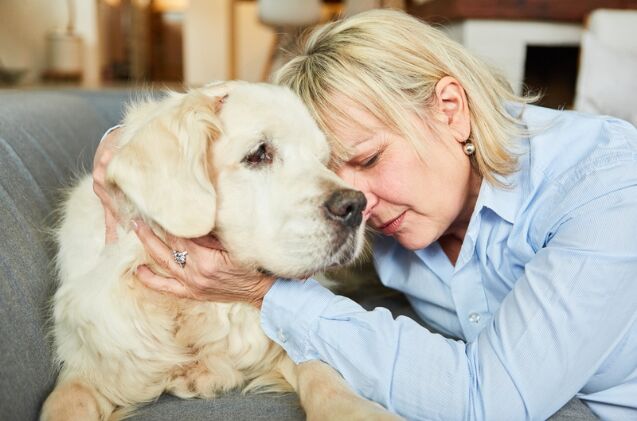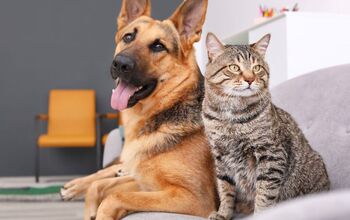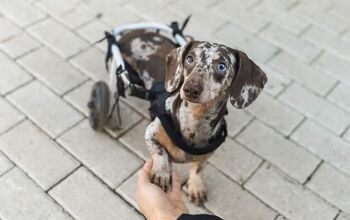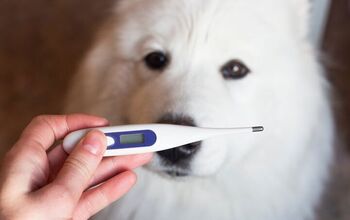Do Dogs Experience Grief?

Anyone who has ever shared their heart and home with a dog can attest to how deep the emotional connection we form with our best friends is. It is this bond that makes saying goodbye so difficult. But are we the only ones experiencing this pain?
If you have recently experienced the passing of a pet or family member and noticed your dog acting a little differently, you may be wondering – Do dogs experience grief, too?
In this article, we will dig into the truth about canine emotions and canine grief. This includes understanding what grief means to your dog, learning to recognize the signs that they may be mourning and tips for helping your best friend navigate this difficult time.
Do Dogs Experience Grief or Mourning?
The short answer is yes, dogs do grieve the loss of a person or animal in their lives. In a 2022 study led by Dr. Federica Pirrone, a veterinary physiologist at the University of Milan, 86% of dog owners reported that they saw a change in behavior in their surviving dog after losing a companion.
Our dogs form close bonds with one another and with us. This can be seen both in wild dogs, with the relationships that exist between pack members, as well as the domesticated dogs of today.
While they can’t tell us how they are feeling (although we wish they could), dog parents often witness physical and behavioral changes that indicate something is “off” for their dog following a loss. This occurs when a family member (human or pet) passes or even if a family member moves away like a child moving out of the family home.
Recognizing that our dogs also go through a grieving process allows us to take steps to help our beloved furry friends deal with this difficult time.
What Are the Signs of a Grieving Dog?
Like people, dogs can experience grief in a variety of different ways. The grieving process can look completely different from one dog to the next. However, you can be on the lookout for some common signs and changes.
Vocalizing
Some dogs are more vocal than others – both in their regular lives and when experiencing complicated feelings like grief. Your dog may whine or bark more. They may try to use vocalization to demand your attention. Alternatively, a once-vocal dog may become quieter as they withdraw during the grieving process.
Anxiety
The loss of a family member often means many changes to adjust to. Dogs thrive off stability and routine, and this sudden change can lead to feelings of stress and anxiety. If you have a dog that is often anxious in new or different situations, the risk of this happening is far greater. Some of the more common signs of anxiety include pacing, trembling, excessive panting or drooling, and being uncharacteristically irritable. There are solutions to help manage or treat your dog’s anxiety, giving them the relief they need as they work through their grief.
Changes in Appetite
Have you noticed your dog is eating less than usual? Food avoidance is a common sign that your dog is suffering from grief – especially if they are avoiding not only their food but also some of their favorite treats. That being said, it could also be a sign of a much more severe health concern. We recommend contacting your veterinarian to rule out any medical explanations.
Clinginess or Withdrawal
Does your dog want to be in your lap 24/7? Do you find you can’t leave your dog’s line of sight? Is your once-loving dog completely avoiding you? Due to anxiety or the intense emotions associated with grief, many dogs will change how they interact with other dogs in the family. Take note of any changes to your dog’s behavior regarding their desire to spend time with you and your other pets.
Depression
Another common symptom of grief in dogs is depression. Signs of depression in dogs include loss of interest in their usual activities, lethargy, and fatigue. Like people, the loss of someone close to your dog can trigger deep, life-changing emotions – this includes emotions that fall under the umbrella of depression.
Have you noticed your dog is mopey or uninterested in engaging with others? Is your dog no longer interested in their daily routine? Canine depression is a very real struggle – one that can often require the help of a professional.
Behavioral or Personality Changes
Is your dog “not acting like themselves.” This may be concerning in most cases, but for a dog experiencing grief, this is a sign that they are working through this challenge. An otherwise outgoing dog may become withdrawn, or an anxious and private dog could suffer from increased anxiety. The sooner you address your dog’s concerns, the better!
No Noticeable Signs
Dogs are masters of hiding pain. For this reason, there is going to be a small group of dogs that demonstrate no changes or challenges at all. For these dogs, it’s as if they are going through life normally. Even if your dog isn’t showing signs of stress, anxiety, or grief, that doesn’t mean that they aren’t experiencing these difficult emotions.
How Long Does Dog Grief Last?
Dealing with the loss of a pet is challenging, whether it’s a recent loss or one that you have been navigating for a whole. The truth is that there is no timeline for grief… While one dog may take 2-3 weeks to work through the loss of a pack member, another dog may start acting out the moment their packmate is gone. This is why paying attention to any changes in your dog is so important.
Your dog’s grief could last two weeks or more than two years. Every dog is different, and so is their grief journey.
How Do You Comfort a Grieving Dog?
Watching your dog go through the grieving process is a challenge as a dog parent. After all, we want nothing more than to solve their pain and suffering. Unfortunately, when it comes to emotional struggles like grief, we can’t fix it. The only way for your dog to move forward is to work through this hurdle.
Here are a few ways you can help your dog navigate the grieving period:
Maintain Your Routine
Dogs thrive off routine and structure. Maintaining your usual schedule can help reduce anxiety, helping your dog work through an otherwise difficult time. This means feeding them at their usual time, continuing to go through the usual bedtime routine, or taking their regular daily walks. Not only will this help your dog, but it will also help encourage you to get up and outside at a time when you are likely also struggling with big emotions.
Avoid Rushing to Clean Up
You may feel tempted to immediately remove any reminder of your pet or family member, viewing it as “closure.” However, this could actually deny your dog a source of comfort. Whether it’s a previous dog’s bedding or a family member’s favorite sweatshirt, those items carry the scent of the person or pet they have lost.
For dogs, that familiar scent is comforting. Consider leaving those items out where your dog can get to them. Some dogs won’t show any interest in these items, and that’s okay. But others will spend time cuddled up with these belongings like our boy Indy did after we said goodbye to our senior girl Daviana.
Give Them Your Attention
You are your dog’s best friend and companion. This bond is essential and could be the comfort and reassurance they need during this time. In addition to maintaining your dog’s schedule, consider making time for extra love, cuddles, and attention. This can be healing both to your heart and your dog’s.
Minimize Alone Time
If your dog previously suffered from separation anxiety, the added emotions associated with grief can make it worse. Even dogs normally fine at home alone may struggle after a loss. If possible, try minimizing the time your dog is left at home alone. If you must leave for work or other plans, consider hiring a pet sitter or dog walker to break up the time. Another option would be to arrange for your pet to stay with friends or family while you are meeting your commitments.
Keep Them Occupied
Like people, your dog may benefit from a distraction. This can keep them from being overly focused on their missing family member. This includes both when you’re spending time at home or if you have to step away. There are many great ways to distract your dog while offering mental stimulation to keep their mind sharp.
Make mealtime a game using food puzzles, snuffle mats, or interactive treat toys. Working additional playtime with interactive games like hide and seek is a fun way to involve the whole family. This is also a great time to focus a little extra attention on obedience or trick training.
Try Calming Treats
If you are concerned about your dog’s anxiety levels as they navigate the stages of grief, there are products that can help. Calming treats often contain natural ingredients like CBD or chamomile designed to help create a feeling of calm and relaxation and ease their anxiety enough that it can be effectively managed. If calming treats don’t work, or your dog simply isn’t interested in them, there are other calming products to consider, including the Adaptil Dog Calming Pheromone Diffuser, the NaturVet Quiet Moments Herbal Calming Room Spray, or the Fancy Pets Calming Pheromone Collar.
Some dogs experience anxiety so intensely during this time that natural products like those mentioned above simply aren’t enough. If this is the case, consider reaching out to your veterinarian. They may be able to prescribe medication that will effectively address your dog’s anxiety either short-term, as they navigate this difficult time, or long-term, if necessary.
Reinforce Good Behavior
One mistake that many dog parents make during a difficult time like this is inadvertently rewarding the “bad” behaviors. These behaviors don’t mean your dog is “bad”. They are just a less-than-desirable response to a negative time. For example, you may notice your dog howling or becoming overly vocal to demand your attention. If you respond by calling them to you immediately for attention or giving them a treat to “quiet them down,” you are telling your dog that engaging in that behavior will bring good things.
Instead, try to ignore your dog when they are acting out. If you need to address it (I get it, a loud dog in an apartment building can’t be simply ignored), firmly tell your dog no or quiet and then reward them only when they listen and respond the way you have asked them to.
While it can be tempting to give in and coddle your dog as they grieve the loss of a family member, you must focus on the long-term implication of your decisions. Giving into your dog’s demands today may give you a short “feel good” moment, knowing that you are comforting them. Still, it sets them up to believe that engaging in this behavior in the future is not only okay but rewarded.
Final Thoughts – Dogs and Grief
If your dog has recently lost a family member, either human or another pet, they may be working through the grieving process. Take note of any changes, physical or behavioral. While it may seem that your dog is trying to make things more difficult, they are likely expressing their own emotional struggles.
By understanding your dog’s grief process, you can make changes to better address their emotional needs at this time.
Have you ever worked through grief with your dog(s)? If so, we would love to hear your tips and tricks!
Join the PetGuide community. Get the latest pet news and product recommendations by subscribing to our newsletter here.

Britt Kascjak is a proud pet mom, sharing her heart (and her home) with her “pack” which includes her husband John, their 2 dogs – Indiana and Lucifer – and their 2 cats – Pippen and Jinx. She has been active in the animal rescue community for over 15 years, volunteering, fostering and advocating for organizations across Canada and the US. In her free time, she enjoys traveling around the country camping, hiking, and canoeing with her pets.
More by Britt
























